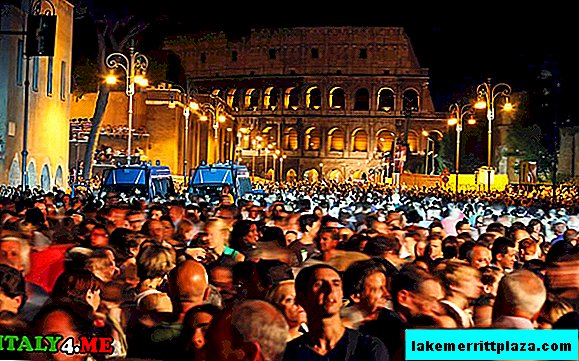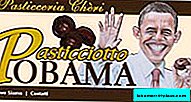United States President Barack Obama is going to Rome on a business visit. The head of state should arrive in the Eternal City on Wednesday evening, but local authorities have already thrown all their strength and resources so that the American president does not remain disappointed, and that nothing threatens the security of an important guest. This explains the rather large concentration of law enforcement officers on the streets of Rome, which the residents of the Italian capital could not miss today.

It is worth noting that the authorities are actively taking all security measures at the facilities that Obama plans to visit. So, today several central streets of Rome were blocked for checks, which caused a storm of indignation among drivers. Many believe that on Wednesday in the city center chaos will reign: the US president intends to visit the Colosseum. Barack Obama travels to the capital of Italy to meet in person with Pope Francis in the Vatican, later to join President Giorgio Napolitano at a business dinner, and then sit down at the negotiating table with Prime Minister Matteo Renzi.

By the way, the arrival of such a high-ranking guest caused a stir not only in the capital, but throughout the country. For example, a baker from Puglia named in honor of the American president a chocolate cake with which he plans to treat thousands of comers in order to symbolically mark Obama's visit to Italy. Angelo Bisconti (Angelo Bisconti), who is an ardent fan of foreign politician, explained that this special pastry, called 'Pasticciotto Obama' ('pasticciotto Obama'), recognized to honor the first African American president. Starting at 7 a.m., he plans to give out 5,000 sweet-filled pies in the heart of Rome, not far from Via Veneto, where the US Embassy is located.
“I understand that my dream of meeting with the president personally is unlikely to come true, but I will still be there,” the master, inspired by the flour affairs, said. “I express my deepest respect to the man who changed my life, and to whom I owe my career success.”
Bisconti is the happy owner of the bakery Pasticceria Chèri, which began to enjoy great popularity after an unusual dessert appeared there. Encouraged by the success of a talented baker last year, opened his own factory in the city of Campi Salentina (Campi Salentina) on US Independence Day - July 4. Bisconti now leads ten apprentices who make about 15 thousand rolls and other sweets per day.

Last year, a successful baker told that the idea of creating an unusual dessert came to his mind on November 5, 2008, while Bisconti and his subordinates carefully considered how to refresh the recipe of their signature pasti cotto, which was previously made exclusively from light dough. After the talented bakery owner changed some proportions of the ingredients and added cocoa to the resulting mixture, he was more than happy and pleased to get a completely new taste of the usual sweetness. However, later Bisconti faced a difficult task: to choose a name for the new product.
 But the baker did not have to rack his brains over the riddle for a long time: quite by accident he learned from the news that America had elected the first African-American president in history. “We immediately understood what our dessert should be called, it was a tribute to the new president,” Bisconti recalls. In order to advertise their new product, the entrepreneurial bakery owner posted a caricature on the official website of the establishment, which depicts a smiling Obama with a pasticotto in his hands. But to find out whether the taste of “pasticotto Obama” is really so unusual, as they say, they will be able to see for themselves tomorrow. But better hurry: the number of sweets is limited!
But the baker did not have to rack his brains over the riddle for a long time: quite by accident he learned from the news that America had elected the first African-American president in history. “We immediately understood what our dessert should be called, it was a tribute to the new president,” Bisconti recalls. In order to advertise their new product, the entrepreneurial bakery owner posted a caricature on the official website of the establishment, which depicts a smiling Obama with a pasticotto in his hands. But to find out whether the taste of “pasticotto Obama” is really so unusual, as they say, they will be able to see for themselves tomorrow. But better hurry: the number of sweets is limited!








